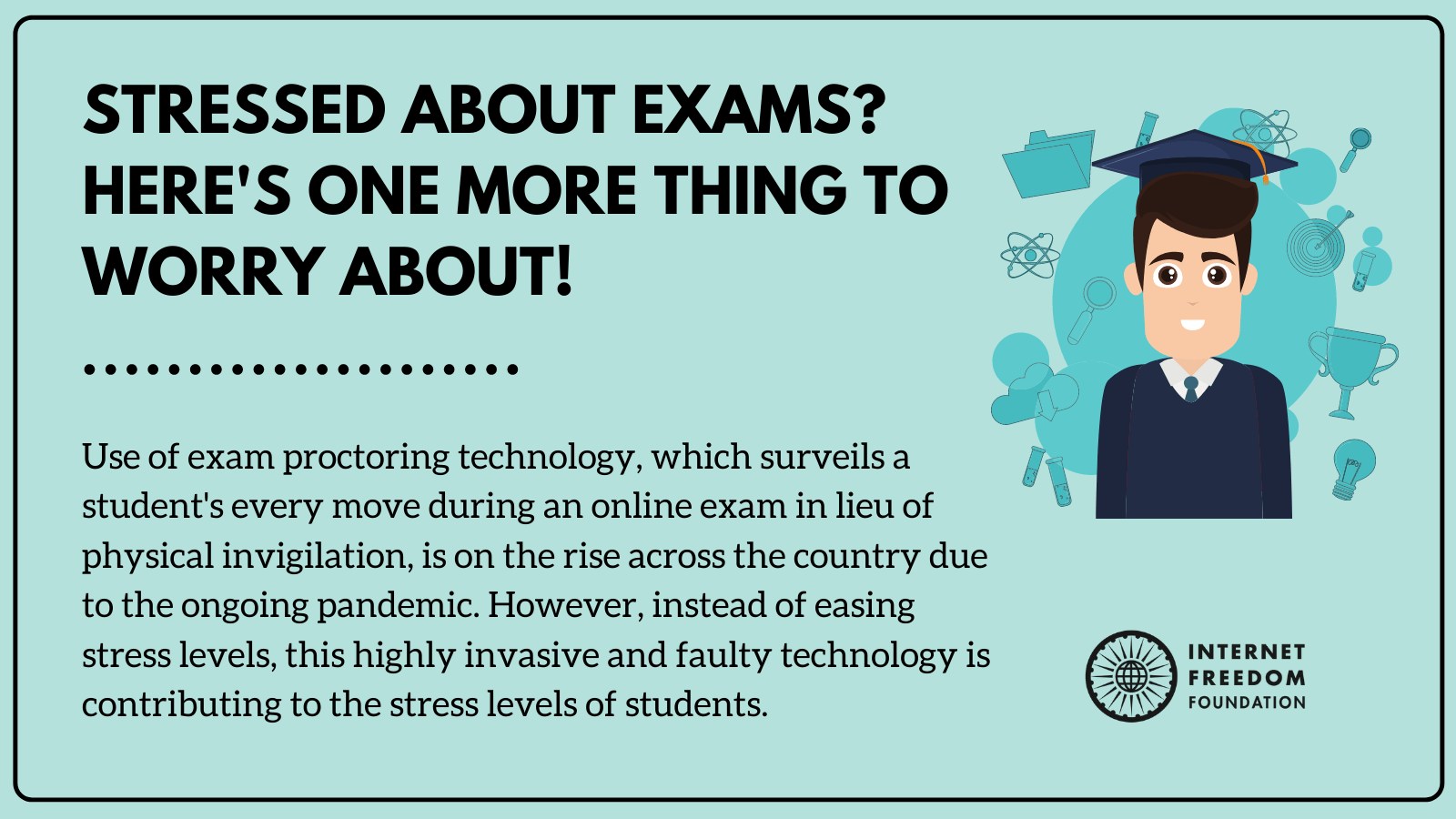
tl;dr
Following multiple reports of the use of exam proctoring technology by various universities across the country, we wrote to the University Grants Commission (UGC) and the Ministry of Education highlighting the shortcomings of this technology and asking them to issue detailed guidelines for conducting online examinations.
What is exam proctoring technology?
Proctoring technology uses AI powered algorithms and tools to keep a check on candidates during online exams. Firstly, proctoring technology uses facial recognition to verify the student’s identity through 1:1 identification. Further, it surveils and records not only the surrounding audio of the student taking the online exam, who has to ensure that there is no noise in the background, but also monitors changes in their line of sight while capturing continuous photographs at intervals of about 15 to 20 seconds, which can amount to 200 to 240 images in an hour. In addition to this, the proctoring technology also continuously monitors all ongoing activity on the student’s screen. According to various reports, this technology is being used in various forms at University of Petroleum and Energy Studies, Dehradun, Delhi Technological University, O.P. Jindal Global University, Sonipat, SRM University, Chennai, Mumbai University and IIT-Bombay to name a few.
Why are we concerned?
A. It is a highly invasive technology.
In addition to being highly invasive as can be seen above, use of this highly invasive technology has led to higher levels of stress and anxiety in students who have already been one of the worst affected groups in the pandemic. The constant threat of being flagged by the technology for a perceived wrongful action in addition to the stress of the exam being given leads to a student having heightened anxiety levels. Here, it is worth mentioning that even while being highly invasive this technology is not fool-proof with multiple viral videos online on how to cheat such proctoring technology.
B. Multiple privacy concerns arise.
Proctoring technology gathers and retains invasive biometric data as well as personally identifiable information (PII) to determine the student’s identity and whether the student is cheating. It collects data such as full name, date of birth, address, phone number, scans of government-issued identity documents, educational institution affiliation, and student ID numbers. Additionally, they also gather information on the devices being used by the student such as records of operating systems, make and model of the device, as well as device identification numbers, IP addresses, browser type and language settings, software on the device and their versions, ISP, records of URLs visited, and how long students remain on a particular site or webpage.
In addition to this data which they gather, they also generate additional data which includes records of gaze or line of sight tracking, records of surrounding audio and records of the continuous video surveillance of the student including almost 200 to 240 photographs which the technology takes at regular intervals throughout the exam. While such gathering and retaining of data is objectively harmful, the harms are increased in India where we do not currently have a data protection law in place to ensure the data privacy of students. Here, it is also worth mentioning that minors are given a higher standard of protection in most data protection regimes across the world.
As per the Hon’ble Supreme Court's decision in Justice K.S. Puttaswamy vs Union of India (2017 10 SCC 1) any justifiable intrusion by the State into people’s right to privacy protected under Article 21 of the Constitution must conform to certain thresholds. These thresholds are legality, necessity, proportionality and procedural safeguards which the universities have failed to meet.
C. Other technical issues may affect candidature or outcome of exam.
Circumstances which are out of the control of the student may end up having an adverse effect on their candidature under the watchful eyes of the proctoring technology. No person can ensure complete silence in his/her surroundings while taking an exam in a residential setting. Additionally, technological issues in the devices being used can arise unexpectedly which cannot be controlled by the student taking the exam. Lastly, technical glitches may be present in the proctoring technology itself, as has been reported by students of various universities which are deploying proctoring technology obtained from an EdTech Startup called CodeTantra.
Internet connectivity which is fast, reliable and affordable is one of the main requirements of proctoring technology however it is still a sensitive issue in India with many remote areas still not having access to the internet as well as the ongoing internet shutdown in Jammu & Kashmir which limits access to only 2G internet.
Our recommendations
In light of the above concerns, we wrote to the UGC and to the Ministry of Education with the following recommendations:
- Issue a directive halting the use of proctoring technology by universities to conduct online examinations.
- Issue detailed guidelines on how online examinations should be conducted while ensuring necessary privacy protections are put in place as per the Hon’ble Supreme Court’s decision in Justice K.S. Puttaswamy vs Union of India (Right to Privacy Judgement).
Important documents
- Representation to the UGC and the Ministry of Education on the ongoing use of proctoring technology dated January 8, 2021 (link)

